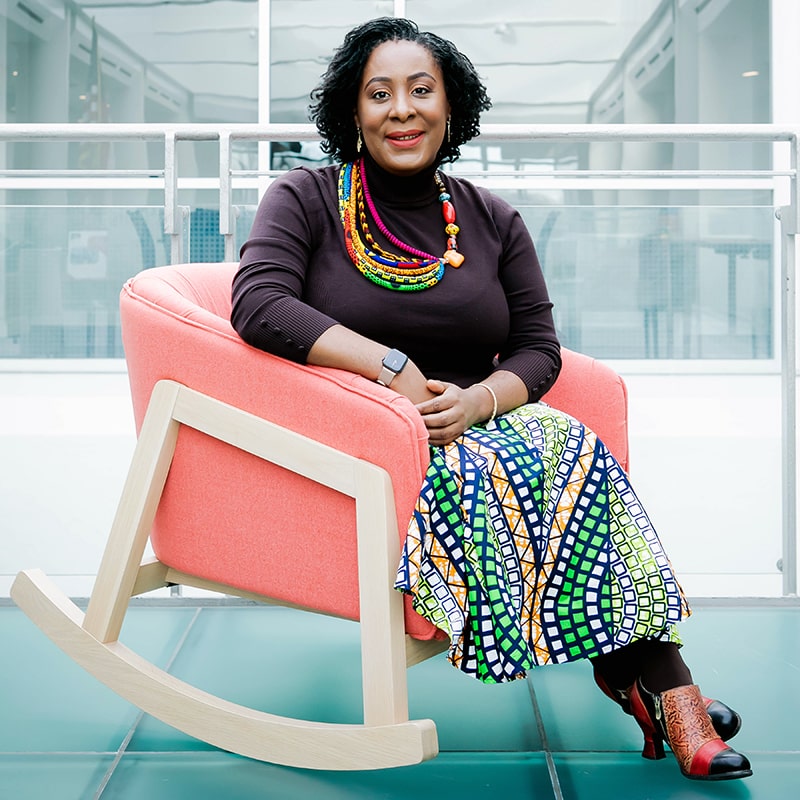Faculty Spotlight: Uju Anya
Uju Anya, associate professor of Second Language Acquisition, joined the Department of Modern Languages in the Dietrich College of Humanities and Social Science in 2021. Her scholarly work is focused on critical applied linguistics, critical sociolinguistics, and critical discourse studies examining race, gender and sexual and social class identities in new language learning through the multilingual journeys of African American students. She is a scholar, a teacher and an author.
Tell me about your research.
I am a linguist. By education and training, I am an applied linguist. In particular, I study second language acquisition (SLA). I examine how adults and older adolescents learn new languages in schools, local communities and study abroad. Language learning is personal change. It transforms your identity as you learn new ideas. In essence, I study how our various social identities like race, gender, sexuality, social class are experienced in language learning and how we shape and negotiate these identities in new languages and cultural contexts.
How does your scholarly work contribute to the field and to CMU?
There is a dearth of Black scholars in the U.S. in language studies, linguistics and language education. When you have few scholars from particular groups, those groups are rarely examined meaningfully. Because of systemic exclusion, my voice is unique and foundational in the field. I am the main scholar looking at race and experiences of Blackness in language learning and one of the few who examine language education from a social justice perspective.
I study how Black students in the U.S. learn new languages in classrooms and multilingual communities. In essence, how we speak our Blackness in new languages. Ultimately, I seek to understand and improve the experiences of Black students in language education. To learn a language, you need opportunities to interact in the language and use it. When you suffer social oppression (race, gender, sexuality, class, etc.), opportunities to engage, interact and improve proficiency are limited. We need to look very closely at how racism and other forms of oppression targeted at people with minoritized identities affect their experiences and outcomes in language learning.
How did you become interested in this field?
I come from a multilingual, multicultural, multinational background. I was born in Nigeria to a Nigerian dad and mom from Trinidad and Tobago. I came to the U.S. when I was 10 years old. When I could first speak, I was speaking English and Igbo. In the U.S., I learned Spanish, Italian, Portuguese and Russian. Above all, Portuguese is my joy. I remember in class seeing a video of people in Brazil who looked like me and spoke Portuguese. I profoundly identified with the Blackness of Brazil and learning their language was the conduit to get closer to this culture. I repeatedly found this in my research as well. Black students are highly invested and succeed in language learning experiences that connect with their identities in meaningful ways.
What are your goals for the next generation of scholars?
Black students and working professionals that SLA and world languages ignore are posting on social media, making videos, creating travel blogs describing what it is like to live abroad as a Black person. This is powerful testimony. I want to mobilize our field to catch up with them.
To do this, my first goal is to prioritize the experiences of Black students in SLA and break the chain of marginalization. I want to train teachers to recognize we have problems of racism and systemic exclusion in world languages. I want to work with the field to develop policies, curriculum, teaching techniques and materials that keep Black students in our K-12 classrooms, college majors and study abroad programs to build this pipeline to bring more graduate students in the field. I want Black people to be excited about learning and speaking new languages and to understand multilingualism is a very strong cultural legacy of the African diaspora.
What are you most excited to have accomplished so far as a faculty member at CMU?
My work is solutions oriented. With a Spencer Foundation grant, I collaborated with colleagues at the University of Pennsylvania and the University of Texas, Austin in October to run a conference titled “Centering Black students in Language Education.” We gathered scholars, practitioners and school and district administrators to address issues and propose changes to benefit Black students in world languages, dual language immersion programs and ESL. We developed curricula, research agendas and partnerships with practitioners in K-12 and have upcoming articles detailing them. Information about the conference can be found by searching the conference hashtag #CenteringBlackStudents on Twitter.
The Faculty Spotlight series features new and junior faculty at the Dietrich College of Humanities and Social Sciences at Carnegie Mellon University. Stay tuned for our next installment to learn more about the dynamic and engaging research and scholarly work being conducted in the college.
